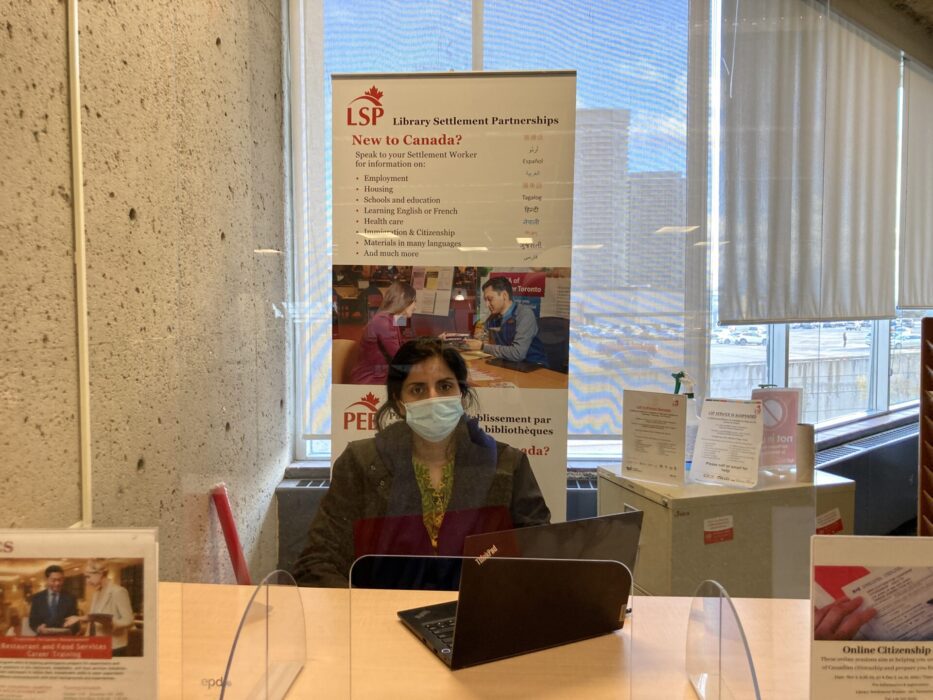The Toronto Public Library (TPL) has several programs to help isolated newcomers settle in the city, but staff say those who need the support may not know about it.
“Toronto is a big city, and we [TPL] sort of know our place and role,” said Amanda French, the social development manager at the Toronto Public Library. “That is important, in terms of welcoming and homing new immigrants.”
French said younger newcomers tend to be more engaged in their communities and with the library system, but older newcomers are often much more isolated. “If they don’t have children, then we don’t have a way to connect with them,” she said.
The census from Statistics Canada indicated the population of visible minorities among seniors rose from 2 per cent of Canada’s senior population in 1981 to 8.1 per cent in 2011.
Although seniors represent a relatively small proportion (3.3 per cent) of newcomers, about 63 per cent of immigrant seniors (65+) reported that they were unable to speak either of Canada’s official languages, English or French, according to 2012 – 2016 data.
Migration has “detrimental effect on mental health,” report says
“Youth, women and older people are now categorized as vulnerable groups that need special attention, in terms of specific kinds of programming,” said John Shields, a professor of politics and public administration, with an expertise in immigration settlement, from Toronto Metropolitan University.
Shields was involved in a research report focusing on these three immigrants groups from 2017 to 2019, which was released by the Joint Centre of Excellence for Research on Immigration and Settlement (CERIS).
According to the report, recent senior newcomers encountered a number of issues, such as difficulty accessing programs that cater their linguistic needs, or insufficient understanding of English or French. They suffered from mental health issues because of these challenges, the report said, and “the process of migration has a detrimental effect on their health.”
Shields highlighted the importance of accessing reliable sources for immigrants. The report indicated many seniors obtain information via informal sources, such as friends or family members, who also received the information informally. This can become inaccurate over time, he said.
“Libraries are a very important source for free, reliable, accessible information,” said Shields.

Toronto’s public libraries held over 200 newcomer-focused programs in 2021, according to public library statistics conducted by the government of Ontario. With 11,360 attendees in the programs, TPL lead the province in terms of reach.
Alongside its collection of books, movies, music, and digital content in more than 40 different languages; Toronto’s public libraries also provide support services for immigrants in about 40 different languages, ranging from citizenship class to up-skill courses.
One of the services public libraries offer is the Library Settlement Partnerships program. Settlement workers offer free consultation in 14 locations throughout Toronto, through which newcomers can get information about employment, language improvement and obtaining a driver’s licence.
“Males are looking for employment, females are looking for language resources,” said Zarmeena Khan, the settlement worker in the Fairview branch.
With four to five people seeking help every day on average, Khan said most of them are aged 30 to 45. They are usually married and have children.
In phase two of the research report by CERIS, newcomer seniors especially appreciate sessions provided in their own language, and public libraries are one of their accessible sources. Libraries provide free computers and internet access, and also the answers to their enquiries about immigration.
French said the libraries can become a first welcoming space for immigrants. “It’s not a silly question to come to a library and say, ‘Can you tell me where the closest Chinese grocery store is?’ We will find it for you and tell you where it is.”
“Sometimes I think a lot of people sort of forget there are different ways that we can welcome newcomers, that are just the basics of food, housing, schools and shelters,” French said.

